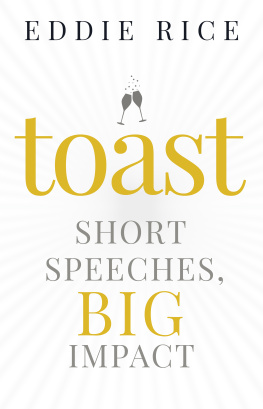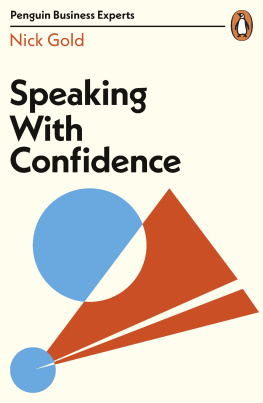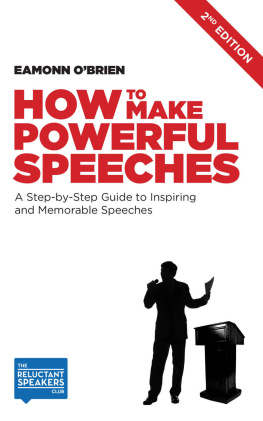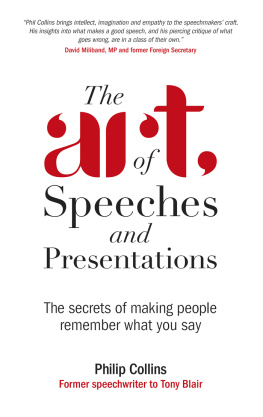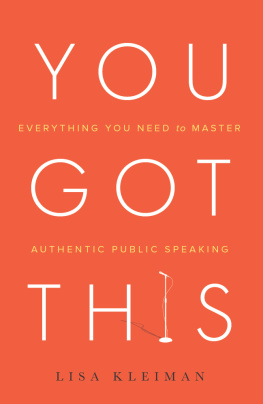Contents
100+ Tips for Speakers
by Wang Yip
Contents
CHAPTER ONE
Introduction
Hi there!
Thanks for downloading this e-book and reading! I know how difficult it can be to get through books so I have written this book in a simple list format so that you can look for the specific skills or areas you want to focus on, pick up a few tips and use it right away. I want to stress the importance of practicing and using these tips in real life and so I encourage you to try to put these tips into practice as soon as possible to see if they are effective for you or how you can adapt them for your own purposes.
The best way to read this e-book:
Let me remind you that this e-book is yours forever! There are many different ways of reading through this e-book but if you have no idea where to start, I would recommend reading through a few tips, remember those that resonated with you and then put them into practice right away. Another way to read is to go into the specific areas that you are working on, read a few tips, put down the e-book and let your brain mull over the tips and then go back to what you were working on to see if you have new ideas.
CHAPTER TWO
Brainstorming speech ideas
If at first the idea is not absurd, then there is no hope for it. - Albert Einstein
In this section, I share a few tips for helping you brainstorm ideas for speeches. If you need to create a speech from scratch but have no idea where to start, these tips will help you get started.
- Use your own life experience - Some of the best stories, anecdotes and situations come from your own life. Remember, whenever you make a decision, make the decision that will give you the best story afterward.
- Talk about your work - Have you worked on anything interesting at work lately? Were you recently promoted? The answers to these questions may give you an idea for your speech.
- Talk about your kids - Kids are always doing interesting things that make for fascinating stories. If you dont have a kid, try exploring something with a kid-like fascination and curiosity - you might find yourself having fun again and with an interesting idea.
- Talk about your big purchases - Maybe you are the kind of person that does not makes big purchases without spending a lot of time talking to people, doing your research and generally just thinking about what the big purchase means to you and your bank account. Walk others through those steps - they may find value in how you make decisions like a big purchase (especially if they are going to make similar big purchases in the near future).
- Explore a weird habit you have - Everybody has weird habits. When I was younger, I always closed my closet door because I was afraid of something coming out of the closet. Weird right? Dig down deep - do you have weird habits that only a few people know? Why do you have these habits? What can other people learn about your weird habit?
- Talk about your desires and passions - You might have a boring life, no kids and a dead-end job but everybody that is ambitious knows where they want to be. What would you do if you couldnt fail? What would you do with unlimited money?
- Talk about your friends (with their permission) - If you have a variety of friends, you are almost certain to know someone that always has a story for you whenever he / she sees you. Ask them if you can share the story and then provide your perspective.
- Read a lot - Whats the last book that you have read? Not skimmed through but really read! Why did you take the time to read through it? What was the key message of the book and why would you recommend that others read it?
- Listen to podcasts - Maybe you dont read - instead, why not just listen to audiobooks or podcasts while youre doing other things? I personally recommend Planet Money - short (less than 20 minutes) and sometimes quite surprising. The Dinner Party Download is another podcast that always seems to teach me something new about the world.
- Watch t.v. / films / documentaries - What was your favorite movie in the last year? The last 5 years? Ever? Why? What made it so good? Was it a particular actor? A scene? The world it was set in?
- Look up random icebreaker questions for speech ideas - If you could punch someone, who would you punch and why? If you could have any condiment come out of our belly button, which condiment would you want and why? When was the last time you did something for the first time? What was it and how did it make you feel?
CHAPTER THREE
Writing your speech
I deal with writers block by lowering my expectations. I think the trouble starts when you sit down to write and imagine that you will achieve something magical and magnificentand when you dont, panic sets in. The solution is never to sit down and imagine that you will achieve something magical and magnificent. I write a little bit, almost every day, and if it results in two or three or (on a good day) four good paragraphs, I consider myself a lucky man. Never try to be the hare. All hail the tortoise. - Malcom Gladwell
My solution for writing your speech when you get writers block: go do something productive with your time (i.e., productively procrastinate) like cleaning or exercising. When you stop thinking about what you want to write, it somehow comes to you when youre not thinking about it.
- Outline your speech - It always helps if you know what you need to write at the start rather than trying to piece together things as you write.
- Leave a little bit at the end - I cant remember where I heard this tip (and I certainly am not claiming it is an original idea) but if you are writing a speech over a number of days, leave a little bit unfinished at the end of the day so that when you pick it up again the next day, you have some momentum going for you.
- Just write it - Open up a blank word document (or open up a blank page in your notebook) and just write down everything that comes to your head. Maybe you already have an outline and if so, do this for a specific section of your speech. Do not worry if it is not related to your speech - just keep writing! Once you feel like you have written down as much as you could, take a break and then come back and organize it after.
- Constructively procrastinate - You have to write this speech in a week you say? Feel free to procrastinate but do it productively (e.g., do the laundry, vacuum, sweep the floors). Doing mindless things may help you think more clearly (e.g., sometimes the best ideas come when youre on the toilet).
- Tackle the easy sections first - Dont force yourself to write something that youre blanking on. If you see another section that you have tons of ideas for, tackle that section first, build momentum and then go back to tackling the section that you were having trouble with.
- Draw pictures - If you feel like you just cannot bring yourself to write, try doodling or drawing a picture instead. You will probably have more fun and you might get some motivation to write from the picture you have drawn.
- Develop an overall theme for your speech - When I was writing essays in high school, I developed one essay that had an overall butterfly metaphor throughout my essay which outlined my transformation from cocoon to butterfly in the essay. By using a theme, it can not only help your audience make a connection to something they are familiar with (and therefore, more likely to remember) but also can help you figure out the different parts of your speech and what you need to speak about in each section. For example, if you were using a butterfly example that describes your life, your beginning would talk about how you are a simple worm (i.e., your humble beginnings), the next phase would be your cocoon phase (i.e., how you prepared / trained for the next phase) and finally, your emergence as a butterfly (i.e., when you stepped out into the light and finally shined).



